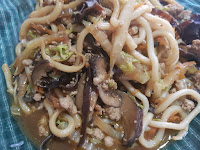
My husband has been making yogurt (also spelled yoghurt, yogourt or yoghourt) for many years. It was only recently that I asked him to teach me how to do it. Actually it is a very simple process. Making it yourself will save you a lot of money. Also, you need not run out of it or inconvenience yourself to go to the store when you run out of it. Furthermore, you can choose the type of milk that you want to use. My husband usually eats it on its own or with honey although at times, he will eat it with cut fruits like apples, honey dew, watermelon and so on or with whole fruits like strawberries, grapes and blueberries.
Yogurt is a food produced by bacterial fermentation of milk. The bacteria used to make yogurt are known as yogurt cultures. Wikipedia. According to Healthline there are 7 impressive health benefits of eating yogurt:
- It is rich in important nutrients like, for example, calcium which is needed for our bones and teeth.
- It's high in protein.
- Some varieties may benefit digestive health. Yogurt contains live bacteria, or probiotics which have been shown to lessen the uncomfortable symptoms of irritable bowel syndrome. Those who have eaten yogurt have shown improvements in bloating and stool frequency
- It may strengthen your immune system and reduce the likelihood of you contracting some illnesses.
- It may protect against osteoporosis.
- It may benefit heart health especially those fat-free and low-fat yogurt.
- It may promote weight management.
However, take note that yogurt may not be for you if you are lactose intolerant and is allergic to milk.
Ingredients:
- 80 g milk powder (You may add slightly more if you want a thicker yogurt.)
- 600 g warm water, about 100 deg F or 38 deg C
- 2 tbsp commercial yogurt (It becomes your starter only for the first time)
Utensils: (Remember: they must be very clean)
- A glass or plastic bottle with a cover (Rinse with hot water just before using it.)
- A plastic spoon
Method:
- Stir milk powder and water till milk powder is dissolved.
- Add commercial yogurt to the milk and stir vigorously.
- Pour the mixture into the bottle.
- Cover the bottle.
- Wrap the bottle with a towel.
- Place it in the cabinet and let the mixture incubate for 12 hours. (Some people only let the mixture incubate for about 7-9 hours. The longer the incubation the more sour would be the yogurt.)
- Remove the bottle from the cabinet and place it in a fridge.
- The yogurt is ready for consumption once it is cold.


















